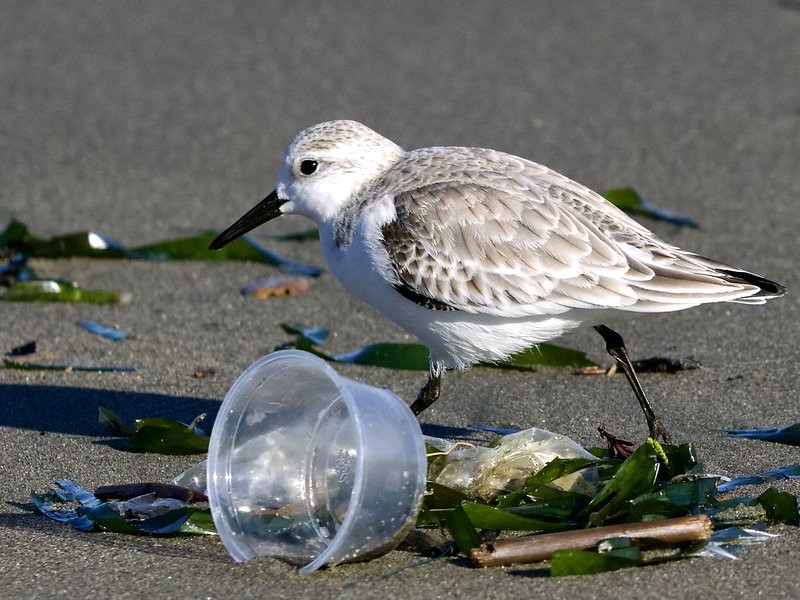
The theme for Earth Day this year is “Planet vs. Plastics.” So it is fitting that just one day later, on April 23, 2024 governments from around the world will begin a week-long negotiating session in Ottawa to hash out a global treaty regulating plastic pollution (the “fourth session of the Intergovernmental Negotiating Committee to develop an international legally binding instrument on plastic pollution, including in the marine environment,” or “INC-4”).
Take action: Urge Canada to stand strong in plastic treaty negotiations
How does plastic pollution affect the planet?
We probably don’t need to tell you that plastic pollution is a huge problem, both on land and in the ocean – for the environment, for human health and for the economy. The equivalent of more than one truckload of plastic enters the world’s oceans and waterways every minute of every day. Plastics in the ocean can harm or kill whales, seals, turtles, birds and fish, as well as invertebrates like bivalves, plankton and corals.
Plastic is also a notable contributor to the climate crisis: it is derived from fossil fuels, such as oil, and produces greenhouse gases at each stage of its life cycle. First, significant emissions are generated during the extraction and transportation process. Next, it is manufactured and refined using a highly energy-intensive and carbon-emitting process.
Then, at the end of its life – which for many plastic products, including the 40% of plastic that is used in packaging, is very short – it is either incinerated, landfilled, recycled or "leaked" into the environment accidentally or through littering. Incinerating is the most damaging from a climate perspective, but landfilled and leaked plastics also continue to emit greenhouse gases as they break down on land, on shorelines and in the ocean.
What are the goals of the plastics treaty?
The global plastic pollution treaty is intended to establish binding international rules to regulate plastic production and consumption, in order to address the impacts of plastic pollution on the environment and public health. The treaty is intended to include provisions to promote sustainable plastic consumption and production, including through enabling a circular economy for plastics, and achieving environmentally-sound management and recycling of plastic waste. It also aims to reduce plastic pollution in the marine environment, and to promote national action plans to work towards the prevention, reduction and elimination of plastic pollution.
Coming out of the last round of global plastic pollution treaty negotiations last fall (“INC-3”), Canada joined the newly-formed High Ambition Coalition to End Plastic Pollution (HAC) – a group of ambitious countries seeking to develop a strong international legally-binding instrument – and committed to ending plastic pollution by 2040. As a member of the High Ambition Coalition, the host of INC-4, and a disproportionately high consumer of plastics, Canada has an obligation to take a leadership role in these negotiations.
As the HAC states on its website, “Without new and effective control measures, plastic production is set to double in 20 years and plastic waste leaking into the ocean is projected to triple by 2040.” This is almost unbelievable. And knowing the impacts that plastic pollution has on ecosystems and people, and that Indigenous, racialized and otherwise marginalized communities bear the brunt of plastic pollution both at home and abroad, this is completely unacceptable.
The global plastic pollution treaty coming out of INC-4 must contain a control measure as suggested in the HAC’s statement – the Treaty must contain a global cap on plastic production.
However, this global cap has become a flash point for fossil fuel and plastics industry lobbyists, threatening the strength of the treaty that is ultimately negotiated.
The original resolution that initiated the global plastic pollution treaty negotiations stated that the instrument was to be developed before the end of 2024. Indeed, after INC-4, there is only one more negotiation session, INC-5, being held in South Korea in November. So, it is crucial that the upcoming session in Ottawa results in significant headway toward achieving the ambitious treaty advocated for by the HAC.
Take action
Please send a letter to Prime Minister Trudeau and Cabinet today to let them know that Canada must step up at the global plastic pollution treaty negotiations this April and take a leadership role in ensuring a strong cap on global plastic production is included in the final treaty text. We encourage you to personalize your letter and tell the government why ending plastic pollution on land or in the marine environment matters to you.
Update: This action tool has been archived, following the end of INC-4 negotiations.
Top photo: Ingrid V Taylar via Flickr Creative Commons